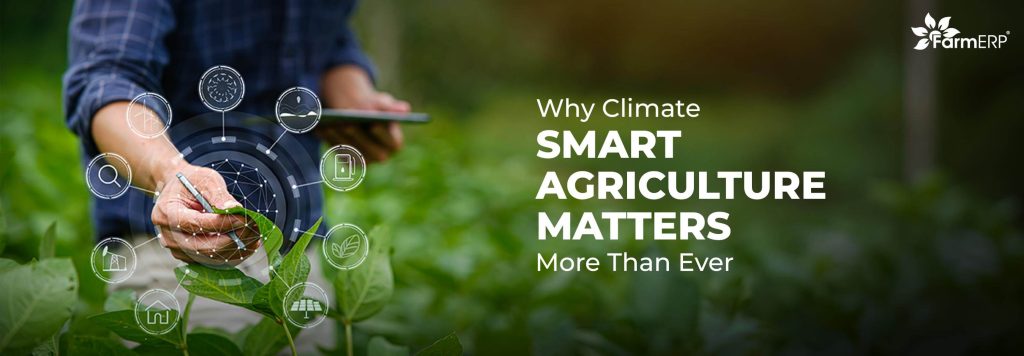Why Climate Smart Agriculture Matters More Than Ever

What Is Climate Smart Agriculture?
Climate-smart agriculture (CSA), as defined by the Food and Agriculture Organization (FAO), is an integrated approach to managing landscapes—cropland, livestock, forests, and fisheries—that addresses the interlinked challenges of food security and climate change. CSA aims to sustainably increase agricultural productivity, enhance resilience, and reduce greenhouse gas (GHG) emissions, wherever possible.
In today’s world of erratic rainfall and increased pest outbreaks, CSA isn’t just an option—it’s a necessity. For food producers, agribusinesses, exporters, and distributors, adapting to climate risks is not merely about survival.
It’s also about maintaining competitiveness in a changing global market where sustainable agriculture practices are increasingly shaping trade and consumer choices.
The Three Pillars of Climate Smart Agriculture
1. Sustainably Increasing Productivity
One of the central goals of climate-smart agriculture (CSA) is to ensure that agricultural productivity remains strong, even under the pressures of climate change. With increasingly erratic weather patterns, including droughts, floods, and extreme temperature swings, traditional farming methods often struggle to deliver consistent yields.
To counter this, innovations like drought-resistant seeds and precision input management are proving game-changing. By using fertilisers and nutrients in a targeted, data-driven manner, farmers can maximise output per hectare while minimising input costs.
2. Adapting and Building Resilience
As climate events grow more severe and unpredictable, resilience in agriculture has become essential. Climate-resilient farming focuses on adopting smart, adaptive strategies that enable farms to withstand environmental stress while sustaining productivity.
One powerful example is the use of climate-resilient technologies for agriculture, such as IoT-based irrigation systems. These systems precisely track soil moisture and local climate data to deliver water only when and where it’s needed, crucial for drought-prone regions where water conservation is key. By reducing reliance on unpredictable rainfall and improving resource efficiency, this approach supports regenerative agricultural practices that help restore soil health and enhance the overall farming ecosystem.
3. Reducing and Removing Greenhouse Gas Emissions
Agriculture is a major contributor to global GHG emissions. According to Nature.com, the global food system accounts for roughly one-third (16–18 Gigatonnes of Carbon Dioxide Equivalent (GtCO₂e)) of human-made emissions, with 11.9 GtCO₂e directly tied to agriculture, forestry, and land use. Tropical deforestation, driven by agricultural expansion, only adds to this footprint.
This means the agriculture sector plays a pivotal role in achieving global climate goals. Technologies such as biochar application, cover cropping, precision fertilisation, and methane-reducing feed additives for livestock are all helping to curb emissions. Additionally, GHG monitoring tools and carbon footprint tracking software now allow producers and agribusinesses to measure, report, and reduce emissions more effectively.
Key Challenges Climate Smart Agriculture Addresses
Unpredictable Weather & Drought
Extreme climate events are no longer rare—they’re becoming the norm. Unpredictable rainfall patterns and prolonged droughts severely impact crop cycles and farm planning.
At FarmERP, we tackle these uncertainties through forecast-based advisory services and smart scheduling tools. By providing timely, data-driven insights, we help agri-enterprises make informed decisions that reduce crop loss and optimise input use.
Soil Degradation & Water Scarcity
Over-farming, chemical use, and poor irrigation practices are degrading soil quality and depleting water resources.
With remote sensing and moisture sensors, agribusinesses can monitor field health and soil moisture levels in real-time. These tools ensure precise irrigation and nutrient application, reducing water waste and revitalising degraded soils.
Carbon Compliance Pressures
As global markets tighten environmental regulations, agribusinesses face increasing pressure to track and reduce their carbon footprint. From the EU’s Carbon Border Adjustment Mechanism (CBAM) to stricter retailer standards, compliance is now a gateway to global trade.
CSA enables producers to adopt sustainable practices while digital tools like carbon accounting platforms simplify emission reporting and facilitate participation in carbon credit markets.
Technology Enablers of Climate Smart Agriculture
Role of AI, ML, and IoT
Artificial Intelligence, Machine Learning, and Internet of Things technologies are transforming how farms operate. From predictive pest management to weather-based sowing recommendations, smart tech is making agriculture both proactive and adaptive.
One standout use case: Water management using AI and satellite data for climate-smart farming involves leveraging advanced system analysis along with climatic and soil data to precisely optimise irrigation schedules. This data-driven approach significantly reduces water waste, boosts efficiency, and promotes sustainable, resource-smart farming practices.
Data-Driven Farm Planning Tools
With advanced analytics and integrations, CSA is now deeply data-driven. FarmERP’s modules empower agribusinesses with:
- Carbon footprint tracking and reporting
- Scenario planning using historical yield and climate data
- Seamless integration of satellite imagery, IoT data, and ERP systems
This holistic view helps in strategic planning and timely interventions.
Traceability & Carbon Credit Access
Sustainability is the new currency in agri-export markets. With blockchain integration, producers can offer QR-based traceability, building trust with global buyers.
In one use case, FarmERP enabled exporters to trace every input and activity across the crop cycle, unlocking access to premium markets and carbon credit programs.
How FarmERP Powers Smart Farming For Climate Change
At FarmERP, we’ve built a comprehensive digital ecosystem tailored to support the three pillars of climate-smart agriculture. Here’s how we ensure sustainable farming with our FarmERP platform
- Smart Irrigation Advisory: Our system offers actionable recommendations based on real-time weather data, crop stage, and soil conditions. This helps farmers irrigate only when needed, conserving water and energy, and improving plant health.
- IoT Integration for Real-Time Soil & Climate Data: With smart sensors deployed in the field, users gain access to continuous updates on temperature, humidity, soil moisture, and more. These insights allow for hyper-local decision-making and timely interventions.
- ERP for Carbon Compliance: Our platform helps agribusinesses track, manage, and report carbon emissions across the production cycle. This ensures carbon footprint reduction in agriculture, which complies with global carbon standards and paves the way for participation in voluntary carbon markets.
- AI-Powered Crop Planning with FarmGyan: FarmGyan, our intelligent advisory engine, leverages AI in agriculture by analysing historical data, weather trends, and crop models to forecast yields. All this will optimise planting schedules and identify potential risks, empowering stakeholders to plan with greater precision and confidence.
- Climate Intelligence Data: FarmERP climate intelligence equips agribusinesses with data-driven insights to anticipate and respond to climate-related risks. By enabling smarter decision-making and adaptive strategies, it supports long-term sustainability and resilience in agriculture.
Global Adoption Trends and Regional Relevance
Climate-smart agriculture is gaining momentum globally, and FarmERP is at the forefront of this transformation. In the Middle East, countries like the UAE, Saudi Arabia, and Oman are actively adopting CSA strategies to overcome harsh climatic conditions and water scarcity. FarmERP has partnered with several agri-enterprises in the region to enable smarter irrigation, resource management, and digital farm planning that support food security agendas.
In India, climate risks are no longer abstract—19 districts are already classified as facing very high climate risk. Our platform is being deployed to help farmers in these vulnerable regions monitor their crops in real-time, adopt sustainable agriculture practices, and boost resilience. Similarly, in the USA, CSA adoption is being driven by the need for compliance, traceability, and sustainability metrics, especially among exporters and large-scale producers looking to meet ESG benchmarks.
Benefits of Climate-smart Agriculture for Agribusinesses
For agribusinesses, adopting climate smart agriculture isn’t just about sustainability—it’s a strategic move toward operational efficiency, regulatory readiness, and long-term profitability. CSA helps enterprises future-proof their operations against climate volatility while opening new avenues for market expansion and revenue.
- Increased ROI: By using smart inputs, real-time monitoring, and predictive planning, agribusinesses can reduce crop losses, optimise resource usage, and improve overall yield consistency.
- Global Market Readiness: CSA practices align with international food safety and sustainability standards, making it easier for producers to enter and expand in export markets.
- Carbon Credit Eligibility: With proper documentation and emission tracking through digital platforms like FarmERP, agribusinesses can qualify for carbon credits, adding a new revenue stream by monetising sustainable agriculture practices.
Final Thoughts – Building a Resilient Future
At FarmERP, we believe that the future of farming lies in resilience, data, and sustainability. Understanding the true essence of climate-smart agriculture is key to driving meaningful change in the agribusiness sector and enhancing productivity. Digital transformation in agribusiness, powered by digital agriculture solutions, is enabling forward-thinking enterprises to adopt climate-smart practices today, ensuring resilience, efficiency, and growth for tomorrow.
Let’s future-proof your farm operations — schedule a demo and explore how FarmERP can support your climate smart agriculture journey.
